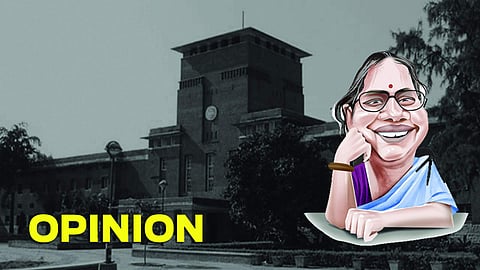

The recent move in Delhi University to drop topics/short stories from the syllabi is no one-off move. It stems from the ruling regime’s ideological commitment to undermine the inalienable link between education and democracy.
In 2008, A K Ramanujan’s celebrated essay on the Ramayana was dropped despite intense opposition from the teachers. Deena Nath Batra of the Hindutva group Shiksha Bachao Andolan Samitee had threatened the university and Oxford University Press (OUP), the publisher, with court cases if the essay was not dropped. OUP sent an apology letter to Batra. Faced with intense criticism, OUP CEO Nigel Portwood's defended the decision with a perfunctory remark on the 'commercial viability' of the decision.
This time around, it was not threats alone. It was amidst the shouting and sloganeering by ABVP members that the decision was taken. But, the seeds of the current impasse were laid a long time ago. Democracy will be jeopardised if education is squeezed between commercial imperatives on one hand and bigotry on the other.
One of the contentious points in the current case is a story on the Gujarat riots. Back in 2008, Batra had wanted riots to be dropped from NCERT textbooks (apart from a longer wish list of banning Urdu words and Tagore). Riots, he argued, could not inspire students and should be dropped. Significantly, NCERT textbooks, under the Congress-led UPA government had covered the 1984 riots as it did other riots.
The question can be asked: ‘Why discuss riots?’ The answer is simple. It is to educate and develop an aware and critical citizenry who would learn from the mistakes of the past. The first Radhakrishnan Commission on Education set up by independent India in 1948 would have agreed that among the stated goals of education was the one ‘to train for democracy’; and to develop an understanding of the past and present’. In the immediate aftermath of the Partition killings, the call was for an education that would promote equality, fraternity and liberty - and thereby ensure that such tragedies are not repeated.
Democracy is a way of life where problems are solved through argument, discussion, deliberation, persuasion and transaction of views instead of dictation, coercion, violence, distrust and conflict. Decisions on education today are diktats imposed by use or threat of force.
A quick contrast between two visions is illustrative. The Radhakrishnan Commission states that “education is the great instrument of social emancipation, by which democracy establishes, maintains and protects the spirit of equality among its members”. The roadmap of the Draft Educational Policy 2019 emphasises creation of the right ‘ambience’ on campus, to create a sense of responsibility, citizenship and national integrity through steps like motivational galleries, display of the national flag, statues of eminent personalities, sports and yoga.
The role of education here is to train citizens to comply with state policies, not engage as informed citizens. It appears to suffice if we wave the national flag, (even beat up one another for not waving it) but know nothing about India’s great freedom struggle and even less about debates that preceded the making of the Indian flag.
(Maitrayee Chaudhuri is a Professor with the Centre for the Study of Social Systems, School of Social Sciences at Jawaharlal Nehru University)
Views expressed here are the author's own
